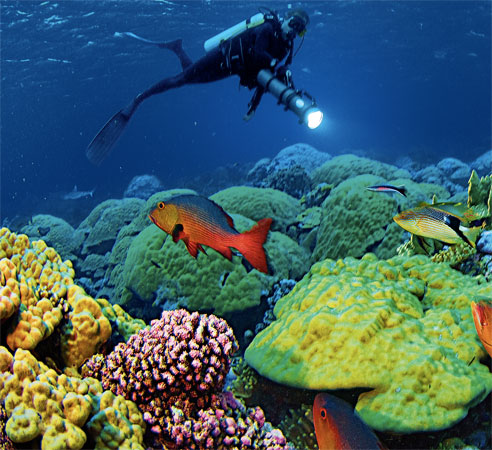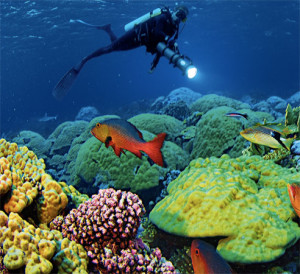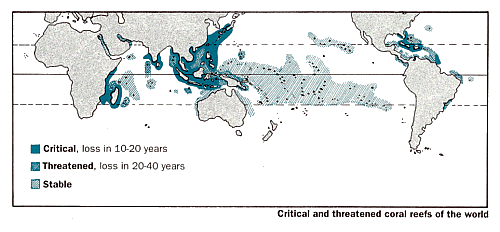
“Coral reefs are the canary in the coal mine of the ocean. . .”
Ocean Matters is currently focusing our research and education efforts on the coral reef in the Caribbean on the island of Utila, Honduras. While our mission is to advocate and educate for all threatened marine resources, we have chosen to work specifically in the coral reef for several important reasons.
Coral Reefs are Vital
Coral reefs are important for ocean health and human communities that live nearby. Coral reefs are home to 25 percent of the animals and plants that live in the ocean. They provide feeding grounds, nursery areas, living space, and places to hide from predators for an enormous assortment of fish and invertebrates like grouper and lobster. For humans, corals provide food and jobs, with more than 500 million people dependent on reefs for their primary source of protein. In places like the Caribbean, a key component of the economy is tourism, which depends heavily on healthy coral reef communities. Coral reefs also provide coastal protection by buffering wave energy and are also a source of countless medicines that are improving and saving lives every day.
 Like the proverbial canary in the coal mine, the health of a coral reef can tell us more about just how in trouble our world’s oceans are. There is reason for concern:
Like the proverbial canary in the coal mine, the health of a coral reef can tell us more about just how in trouble our world’s oceans are. There is reason for concern:
- 75% of fish populations are declining or are being fished to their biological limits.
- Nearly two thirds of the harvest of fish world wide depend on coastal mangroves, wetlands, seagrass beds, and coral reefs — all ecosystems that are seriously threatened.
- In the Caribbean as much as 70% of beaches studied over a ten-year period had eroded.
- Harmful algal blooms along the United States coastlines increased from 200 in the 1970s to 700 in the 1990s. Since 1991, these algal blooms have caused almost $300 million damage in terms of fish kills, public health problems, and lost tourism revenue.
- Studies by the world’s climate scientists indicate the expected increase in ocean temperatures could result in a sea level rise of as much as 95 centimeters (3.1 feet) at the end of this century.
- According to a recent report by NOAA, the warming of the tropical oceans by trapped greenhouse gases is now believed responsible for the devastating weather impacts of El Nino/La Nina, a trend which is predicted to increase in frequency.
- Less than one tenth of one percent of the deep sea has been explored.
- For most of the 25,000 kinds of fish we’ve identified, little is known about them other than a name.
- Although two-thirds of our planet is water, a review of scientific papers shows that terrestrially-oriented research outnumbers marine topics 13:1.
- Scientists understand little about many of the systems upon which the health of the ocean — and ultimately, our planet — depend.
Coral Reefs Are Threatened Worldwide
- Assessments to late 2000 show that 27% of the world’s coral reefs have been irrevocably lost, the greatest damage being in the Indian Ocean, where 59% of reefs have been lost.
- Coral cover has decreased on most Caribbean islands because of pollution and coral disease (i.e. in Jamaica coral cover dropped from 52% in the 70s to 10-15% in 2001.)
“Many scientists believe actions taken or not taken in the next 10-30 years will irrevocably decide the fate of the coral reef.”
- Globally, it is estimated that 40% of the world’s coral reefs have been lost by 2010, and another 20% in the 20 years following unless an urgent management plan is implemented.
- If global warming trends continue, coral reefs, which live at the upper tolerances of temperature already, will be among the first ecosystems devastated. Past episodes of warming water (most recently during El Nino 1998) resulted in large scale mortality and bleaching of corals. While corals can recover from such temperature fluctuations, sustained temperature increases would most likely result in permanent mortality.
- Assessments to late 2000 show that 27% of the world’s coral reefs have been irrevocably lost, the greatest damage being in the Indian Ocean, where 59% of reefs have been lost.
- Coral cover has decreased on most Caribbean islands because of pollution and coral disease (i.e. in Jamaica coral cover dropped from 52% in the 70s to 10-15% in 2001.)
- Globally, it is estimated that 40% of the world’s coral reefs have been lost by 2010, and another 20% in the 20 years following unless an urgent management plan is implemented.
- If global warming trends continue, coral reefs, which live at the upper tolerances of temperature already, will be among the first ecosystems devastated. Past episodes of warming water (most recently during El Nino 1998) resulted in large scale mortality and bleaching of corals. While corals can recover from such temperature fluctuations, sustained temperature increases would most likely result in permanent mortality.
